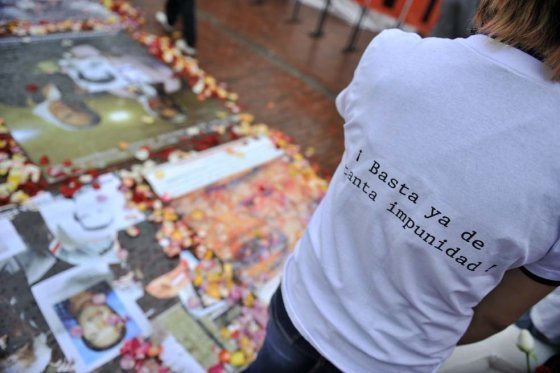“El doloroso listado de asesinatos de defensores/as de derechos humanos en Colombia, que entre el año 2016 y lo que va corrido de 2017 llegó a 200 homicidios”.
Source El Espectador
Con el reciente asesinato de un líder social, la cifra llega a 200 entre 2016 y lo que va corrido de 2017. Fiscalía trabaja en esclarecimiento de casos.
A comienzos de la semana pasada fue asesinado en el municipio de Caloto (Cauca), Jair Mera. Se trata del integrante de la comunidad indígena Huellas y hermano de la exconsejera de la Asociación de Cabildos Indígenas del Norte del Cauca (Acin), Luz Eida Julicué Gómez. Su homicidio se produjo a manos de sicarios que le propinaron varios disparos. Lo paradójico del hecho es que, según la Red de Derechos Humanos del Suroccidente Colombiano, el hecho ocurrió a menos de 200 metros de la estación de policía y cerca de una base militar.

De esta manera, aumentó el doloroso listado de asesinatos de defensores de derechos humanos en Colombia, que entre el año 2016 y lo que va corrido de 2017 llegó a 200 homicidios. Una cifra que se consolidó luego de cruzar los reportes oficiales de la Organización de Naciones Unidas (ONU), el movimiento político Marcha Patriótica, la organización Cumbre Nacional Agraria y la Defensoría del Pueblo, quienes vienen reportando sus informes a la Fiscalía General de la Nación, con el propósito de que esclarezca el origen de los asesinatos y aplique justicia para evitar la impunidad.
Con estos reportes, las denuncias en los despachos judiciales, las audiencias públicas, el clamor de las víctimas y los requerimientos de organismos de derechos humanos en Colombia y en el exterior, el fiscal Néstor Humberto Martínez, junto con la vicefiscal María Paulina Riveros, diseñaron la primera estrategia de priorización para la investigación y judicialización de agresiones contra defensores de derechos humanos, líderes sociales, políticos y comunales. Su aplicación se empezó a ejecutar y se mantendrá como política institucional hasta el año 2020.
Puede Leer el artículo completo aquí